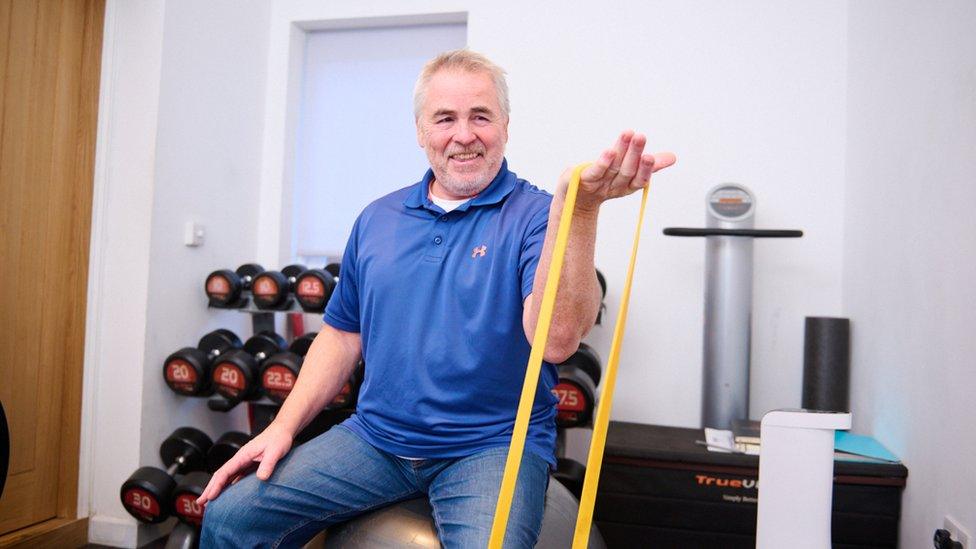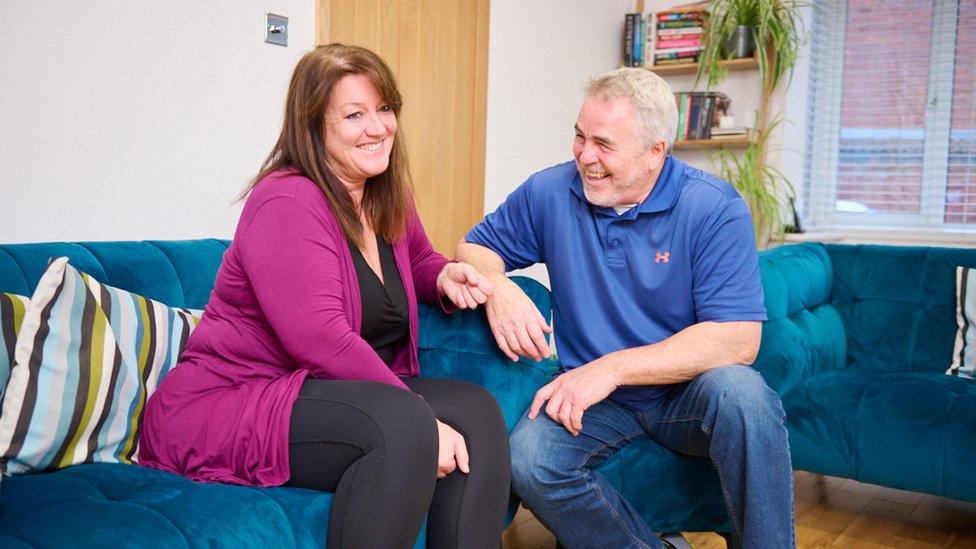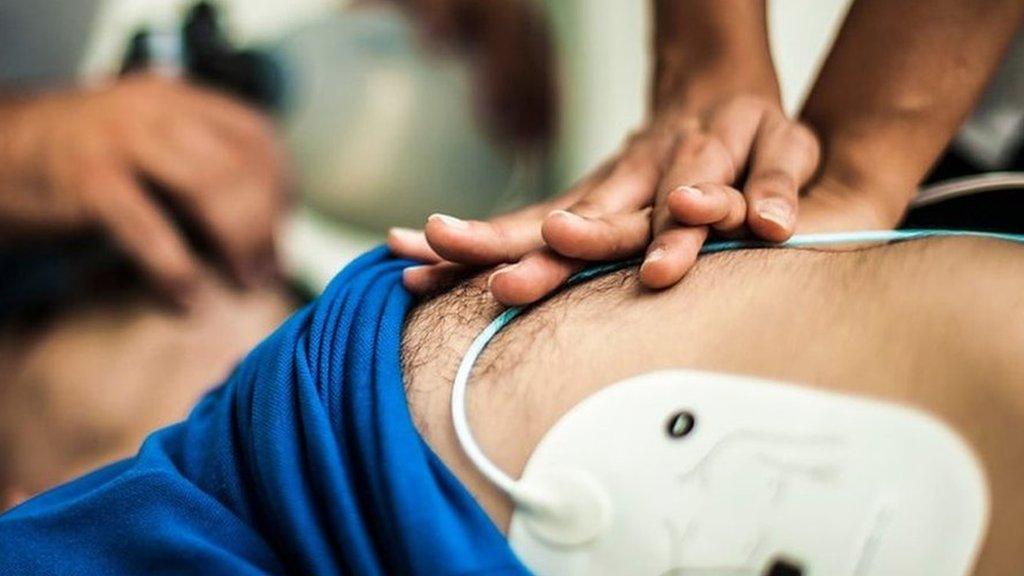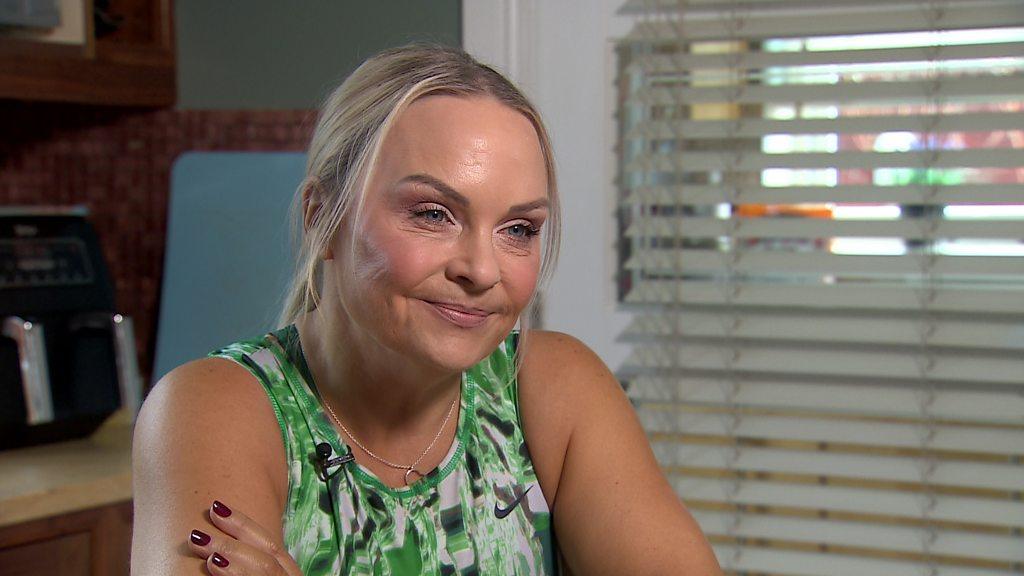Cardiac arrest survivor told 'people don't survive what happened to you'
- Published

After suffering cardiac arrest, Steve Bond's heart stopped for 40 minutes. He survived, thanks to his wife performing life-saving CPR
New figures from the British Heart Foundation (BHF) reveal that Northern Ireland is leading the way for life-saving skills in the UK.
The report found that almost three-quarters of adults can perform CPR and almost all surveyed believe it is an important skill to learn.
In the event of a cardiac arrest, having learned CPR can be the difference between life and death.
This fact was brought close to home for one Belfast couple.
Steve Bond from Belfast "dropped dead" after suffering a cardiac arrest at his accommodation while working at an international golf event in 2022.
Soon after he collapsed, his wife, Andrea, quickly realised something was "horribly wrong", and saved his life by performing on-the-spot CPR whilst the ambulance was on its way.
'People don't survive what happened to you'
Mr Bond, 61, told BBC Radio Ulster's Good Morning Ulster programme that he was "fit and "ate well" so the cardiac arrest came as a surprise.
"When I got out of hospital, my friends were gobsmacked that this had happened to me.
"It has changed my perspective on life completely.
Doctors told the father-of-two that his heart had stopped for around 40 minutes. He recalled that "consultants at the hospital came to see me and said: "People don't survive what's happened to you, that's down to your wife doing CPR at the scene."

Steve’s wife Andrea Bond, who is a nutrition and fitness coach, is determined to spread awareness on the importance of learning life-saving skills
'Everything was going horribly wrong in front of me'
Andrea had began to perform CPR on Steve before the ambulance operator had told her to.
It was 13 minutes before the ambulance arrived.
She said: "Everything was going horribly wrong in front of me."
Andrea had lost her mother and had watched her father die in front of her as a child. She told Good Morning Ulster: "I thought, I can't just have him (Steve) die in front of me, I knew I had to do something."
How to use a defibrillator and save a life
"I had been trained many years previously in first aid.
"But you sort of learn mostly by osmosis, through TV and adverts of bus stops and stuff like that.
"You don't realise how much you actually absorb."
'Help protect the heart of someone you love'
On average there are over 1,400 out-of-hospital cardiac arrests every year in Northern Ireland.
Out of those, less than one in ten people survive.
Around 80% of cardiac arrest cases happen at home, which is why the British Heart Foundation is pressing for as many people to learn CPR as possible.
Fearghal McKinney, Head of the British Heart Foundation Northern Ireland, said: "It is reassuring that nearly three quarters of people surveyed in Northern Ireland have been trained in CPR and the majority feel confident using it. However, our mission during Heart Month is to further increase those figures.
While 74% of adults in Northern Ireland can perform CPR, Scotland followed closely behind with 71%, Wales at 60% and England at 58%.
"Every moment matters when someone has a cardiac arrest, and being able to step in and perform CPR could be the difference between life and death. A cardiac arrest can affect anyone, at any time, so we want as many people to learn CPR as possible," Mr McKinney added.
The BHF has developed an online tool, called RevivR, to help people learn CPR.
Mr McKinney said: "With our tool RevivR, all you need to learn how to save a life is a spare 15 minutes, a phone and a cushion.
"Give it a try during your next coffee or lunch break - it could help you save a life, a loved one."
Related topics
- Published23 August 2021

- Published16 November 2023

- Published3 November 2011
